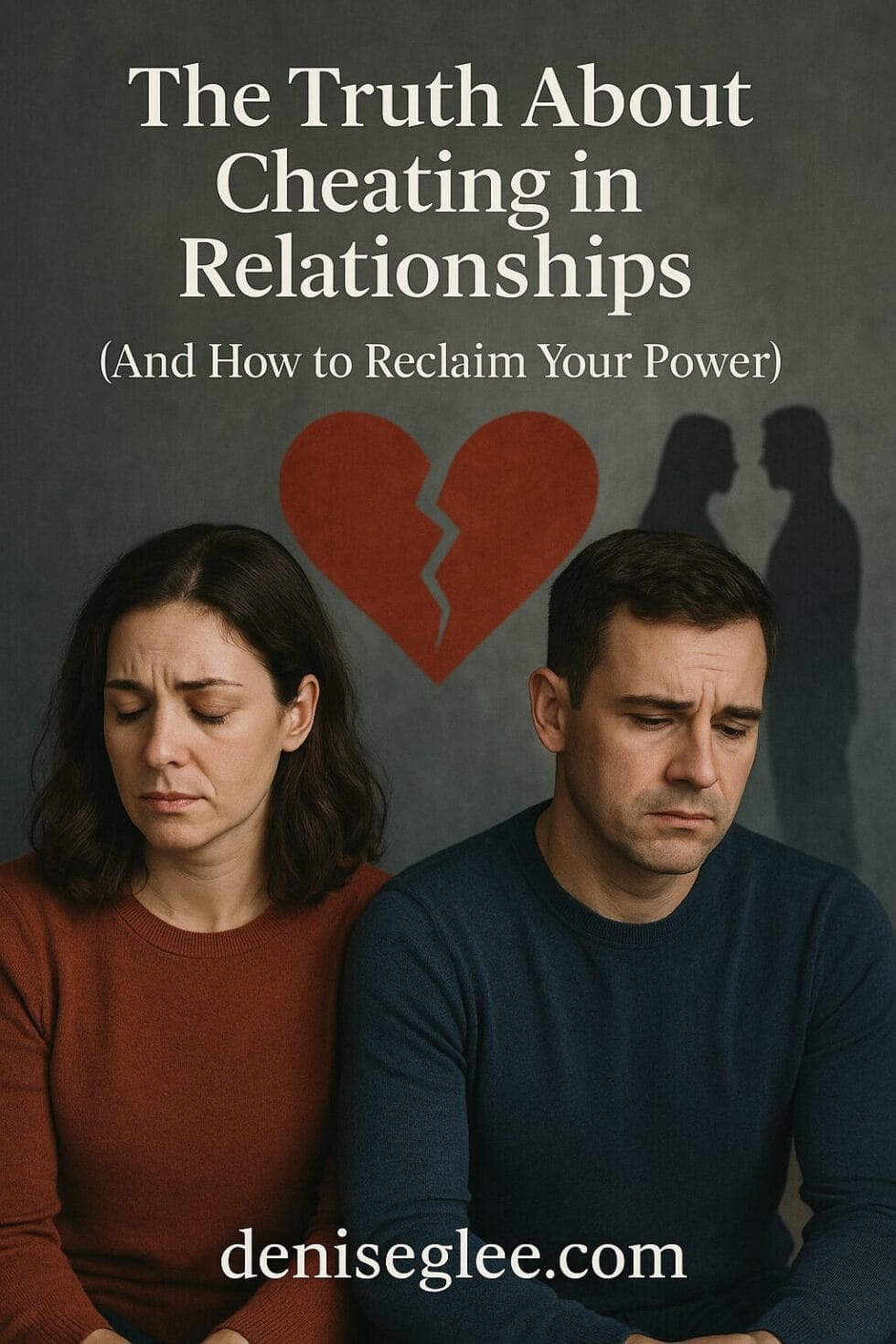
The Truth About Cheating in Relationships (And How to Reclaim Your Power)
- Updated: May 13, 2025
Cheating in a relationship doesn’t just happen out of nowhere. It’s often the byproduct of unmet needs, old wounds, and unhealthy coping habits.
Whether you’re the one who cheated or the one who got hurt, this article is here to cut through the noise.
No shame. No fluff.
Just the real reasons people betray—and how you can reclaim your power after the damage is done.
The Psychology of Justifying Cheating in Relationships

You know you haven’t been there for me the way you used to!
When caught cheating, people often try to externalize the blame. They want to create excuses to avoid feelings of guilt and avoid taking responsibility for their actions. By putting distance between themselves and their own behavior, the cheater can rationalize their actions. Let’s some ways cheaters make excuses.
The 5 Most Common Excuses Cheaters Use (And Why They’re So Damaging)
- “You don’t dress sexy or act like you used to!”
- This excuse blames the partner for not being attractive enough or do the exact same things in the beginning of the relationship, justifies their decision to stray. It suggests that keeping things sexy or brining excitement into the relationship is solely the partner’s job.
- “After the baby, I just don’t find you attractive.”
- This is another form of externalizing the blame on the partners. He is saying changes in the partner’s body or lifestyle post-childbirth are the reasons for the affair. It not only blames the partner for natural changes but also disregards the profound life transition that both partners experience after having a child.
- “It’s normal in my culture!”
- By saying cheating is fine in their culture, the person tries to make their behavior seem normal and not so bad. This excuse tries to avoid taking personal responsibility by saying their culture accepts it. In a study by Nature, researchers found most cultures actually do not accept cheating.
- “You never listen to me!”
- This justification shifts the blame to the partner’s perceived lack of emotional support or attention. It suggests that the cheater sought comfort and understanding elsewhere because they felt neglected in the relationship.
- “I was drunk and it meant nothing.”
- This excuse attempts to downplay the seriousness of the affair by blaming it on alcohol. It suggests that being under the influence removes personal responsibility and that the cheating wasn’t intentional or meaningful.
Cheating Doesn’t Just Hurt the Relationship—It Wounds the Individual
How Unhealed Family Patterns Show Up in Cheating

Cheating in a relationship often ties back to lessons learned in childhood. Many people grow up in families where unhealthy habits like hiding the truth, avoiding hard conversations, or blaming others were normal. These patterns can follow them into adult relationships without them even realizing it.
For example, if someone’s parents didn’t take responsibility for their actions or avoided conflict, they might do the same. For others, cheating may stem from witnessing it at home. This doesn’t excuse cheating, but it helps explain why some people fall into unhealthy behaviors, even when they want love and connection.
Breaking these patterns takes more than just wanting to change. It starts with understanding how your family shaped your views on trust and honesty. Once you see the connection, you can start making better choices and build stronger, more open relationships.
If this sounds familiar, I shared more about it in a social media post below. Click the link to join the conversation!
Have you found yourself replicating in adulthood what you saw in your childhood?
— Denise G. Lee (@DeniseGLee) December 30, 2024
I have.
And I know many of you have as well. I’ll never forget one conversation I had with a former client.
With tears in her eyes, she said, “That’s what men do. They cheat and leave you.”
I…
The Impact of Gaslighting

Gaslighting is a form of psychological manipulation where someone tries to make another person doubt their own perceptions and sanity. In the context of infidelity, gaslighting can manifest in several damaging ways:
Blaming You: They make you think it’s your fault they cheated. This makes you feel bad about yourself and unsure of what’s real.
Denial: Refusing to acknowledge the affair, even when presented with evidence. Denial can create confusion and self-doubt in the partner, making them question their own reality.
Minimization: Downplaying the significance of the affair to make it seem less harmful. This can lead to the partner feeling as though their emotional pain and betrayal are not valid or important.
Gaslighting can mess you up mentally, causing anxiety, sadness, and making you feel worthless. It can also make it hard for you to trust others and leave you feeling really hurt.
In my work, I often see how the childhood of each partner contributes to the mistrust and cheating in the relationship. Let’s dive deeper into this in the next section.
If you don't feel safe with your own feelings, it is super easy to offload your pain and sadness onto others. That way, you can put distance between yourself and your own pain.
Denise G Lee Tweet
When Childhood Pressure Turns Into Adult Betrayal

Lots of people who cheat on their partners grew up in strict families where everything had to be perfect. These families put a lot of pressure on their kids to be the best and to never mess up. They tend to latch onto codependent partners who will help them evade, avoid or deny their own internalized shame. Let’s dive into some theories that support this idea.
The Deeper Psychology: Why Some People Cheat Even When They Know It’s Wrong
Attachment Theory, developed by John Bowlby, suggests that the way we form connections in our early years can greatly affect our relationships later in life. People raised in environments where love and approval were only given when they met high standards might struggle with feelings of not being good enough and fear of failing. This could push them to seek validation outside their main relationship.
Cognitive Dissonance Theory, developed by Leon Festinger, proposes that when people do things that don’t match their beliefs, it makes them feel uncomfortable. To ease this discomfort, they often find reasons to justify their actions. That’s why someone might work hard to convince themselves and others that cheating is okay.
If you don’t feel safe with your own feelings, it is super easy to offload your pain and sadness onto others. That way using cognitive dissonance, you can put distance between yourself and your own pain.
Now that you know the psychology behind cheating, let’s talk about how you can escape from the need to people-please and speak with honesty and integrity.
2 Communication Fixes That Can Save—or End—Your Relationship
It’s really important to spot and stop these bad habits for you to grow as a person and have better relationship with your current or future partner if you choose to end your current relationship. Here are some ways to help you do that:

Communication Tip #1: Spot Poor Communication
The first step to stopping these bad habits is spotting the signs. You can’t fix what you cannot see. Here are some clues that someone might be making excuses for their bad behavior:
Lots of Excuses: Always finding reasons for what they do wrong or blaming others. This is a way to avoid admitting they messed up.
Avoiding: Dodging tough talks or situations to escape blame. This could mean not talking about the affair or changing the subject when it comes up.
Denial: Not admitting there’s a problem, even when it’s obvious. This includes denying the affair or saying it’s not a big deal.
While we cannot predict nor control how our partner responds to us we can be aware of how we speak.
Denise G Lee Tweet
Communication Tip #2: Learn How to Speak Better
Whether we choose to admit or not, most negative reactions start with poor communication. While we cannot predict nor control how our partner responds to us we can be aware of how we speak. Yes, we can improve how we speak with our partner. Here are some tips for talking better in your relationship:
-
Honesty: Be honest about how you feel and what you’ve done. This builds trust and makes your bond stronger.
-
Active Listening: Pay full attention when your partner talks and show you understand how they feel. Don’t interrupt, and let them know you get what they’re saying.
-
Set Aside Time for Conversations: Make time each day to talk without distractions, so you can focus on each other and discuss important issues.
-
Use “I” Statements: Speak from your perspective to avoid blaming your partner. For example, say “I feel hurt when…” instead of “You always…”
-
Stay Calm and Respectful: Keep your tone calm and avoid yelling or name-calling. Respect each other’s viewpoints even when you disagree.
-
Empathy: Understand and share your partner’s feelings. This helps you connect emotionally and shows you care about them.
Need more tips? Check out this article. Now, you may be thinking, “Well, does this mean I should stay or go?” In the next section, we will discuss your options.

What Happens Next? To go or Stay with a Cheater?
After two years of individual and couples therapy, Yolanda and I decided to part ways. I forgive Yolanda but couldn’t imagine staying with someone who had a long track record of lying to my face. – Sam
My family and friends told me that I was crazy. My mom was the most vocal of them all. She said that the kids and I deserved better. But they didn’t know the work Mel and I did to work through the pain. We just hit a rocky patch and value our love too much to let it go. This healing process taught me ways I hurt him as well. – Gregg
I included these thoughts from Gregg and Sam to prove a point – you and your partner are the ones who must decide what is best. Here are some questions to ask yourself before making any decision that will impact you and potentially any family members who live with you.
Key Questions to Help You Decide: Should You Stay or Leave Your Relationship?

- Do I still love my partner?
- Can I trust my partner again?
- Is my partner truly remorseful and willing to change?
- Do we communicate openly and honestly?
- Am I willing to forgive and move forward?
- How will this decision impact my children or other family members?
- Can we both commit to counseling or therapy?
- Am I staying out of fear or for the right reasons?
- How do I feel about myself in this relationship?
- What do I want for my future?
- These questions can help you gain clarity on your feelings and guide you in making the best decision for yourself and your family.
These questions can help you gain clarity on your feelings and guide you in making the best decision for yourself and your family.
"After all these years, she should have known better!"
— Denise G. Lee (@DeniseGLee) December 18, 2024
Talking to men experiencing heartbreak can be challenging—let me tell you.
As a woman, it’s easy for a man to unconsciously project his pain onto me, casting me as an unwilling representative of every woman who’s ever hurt…
Recently, I had a conversation with a client who is dealing with the aftermath of unfaithfulness in his relationship. I shared about it on social media—click the above to join the conversation.
Whether you choose to stay or leave, the image below summarizes my five tips to improve your communication skills now and in future relationships (if that’s what comes next).
Up next, I’ll share my final thoughts.

Common Questions About Cheating (And Real Answers You Deserve)
If you’ve been cheated on—or you’re trying to understand your own actions—you probably have more questions than answers. Here are a few that come up the most often.
Can a relationship survive cheating?
Yes—but only if both partners are willing to do the hard emotional work. That includes accountability, communication, and often outside help.
Why do people cheat if they’re happy?
Sometimes, cheating isn’t about the relationship—it’s about unhealed parts of the person doing it. Old wounds can show up in reckless ways.
Should I confront the person my partner cheated with?
It’s tempting, but rarely helpful. Focus your energy on the relationship—or your own healing—not the outside party.
Final Thoughts
Cheating doesn’t just wreck relationships—it can wreck your sense of self. But here’s the truth: your power is not gone. It’s waiting for you to reclaim it. Whether you’ve been betrayed or are facing your own choices, healing takes more than time. It takes truth, clarity, and courage.
If this article stirred something in you, I’d love to hear your story.
Did you stay or walk away after infidelity? What helped you decide?
Click here to share your experience — your insight might help someone else find their way through.
And if you’re deep in this struggle and want personalized support, I’ve got space for that too. As a healing and leadership coach, I help people move through emotional chaos with clarity and integrity.
Let’s work together to reclaim your power—on your terms.
🎧 Additional Resources
Podcast: Click the play button below to listen to a topic I spoke about fixing disrespect in my Introverted Entrepreneur series
Related Post: What to Do After the Affair
Book I Recommend: The State of Affairs: Rethinking Infidelity by Esther Perel





